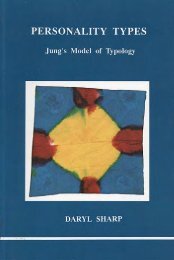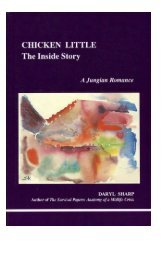Digesting Jung: Food for the Journey - Inner City Books
Digesting Jung: Food for the Journey - Inner City Books
Digesting Jung: Food for the Journey - Inner City Books
You also want an ePaper? Increase the reach of your titles
YUMPU automatically turns print PDFs into web optimized ePapers that Google loves.
25<br />
The Religious Attitude and Soul-Making<br />
Among all my patients in <strong>the</strong> second half of life—that is to say, over<br />
thirty-five—<strong>the</strong>re has not been one whose problem in <strong>the</strong> last resort<br />
was not that of finding a religious outlook on life. 86<br />
There are those who misunderstand <strong>Jung</strong>ian psychology to be a religion,<br />
and <strong>for</strong> that reason ei<strong>the</strong>r worship it as a fount of knowledge<br />
or decry it as <strong>the</strong> devil’s own work. <strong>Jung</strong> himself denied that his<br />
school of analytical psychology was a religious movement:<br />
I am speaking just as a philosopher. People sometimes call me a religious<br />
leader. I am not that. I have no messages, no mission. I attempt<br />
only to understand. We are philosophers in <strong>the</strong> old sense of<br />
<strong>the</strong> word, lovers of wisdom. That avoids <strong>the</strong> sometimes questionable<br />
company of those who offer a religion. 87<br />
On <strong>the</strong> o<strong>the</strong>r hand, <strong>Jung</strong> did believe that <strong>the</strong> human longing <strong>for</strong><br />
consciousness is essentially a religious activity. For instance, in an<br />
essay identifying five prominent instincts—creativity, reflection,<br />
activity, sexuality and hunger—he included <strong>the</strong> religious urge as a<br />
subset of reflection. 88<br />
<strong>Jung</strong>, himself a Swiss Protestant pastor’s son who decried his<br />
fa<strong>the</strong>r’s mindless faith, 89 stressed that when he spoke of religion, or<br />
“<strong>the</strong> religious urge,” he was not referring to belief in a particular<br />
creed or membership of a church, but ra<strong>the</strong>r to a certain attitude of<br />
mind. He described this attitude in terms of <strong>the</strong> Latin word religio,<br />
from relegere, meaning a careful consideration and observation of<br />
irrational factors historically conceived as spirits, demons, gods,<br />
86 “Psycho<strong>the</strong>rapists or <strong>the</strong> Clergy,” Psychology and Religion, CW 11, par. 509.<br />
87 C.G. <strong>Jung</strong> Speaking, p. 98.<br />
88 “Psychological Factors in Human Behaviour,” The Structure and Dynamics of<br />
<strong>the</strong> Psyche, CW 8, pars. 235ff.<br />
89 See Memories, Dreams, Reflections, pp. 92ff.<br />
95










